Jailed Iranian Rights Activists Ready To Testify Against FM Claims
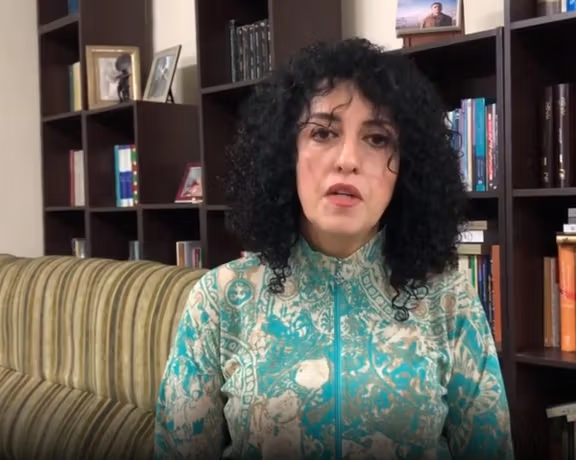
In response to Iran's foreign minister’s denials of rape in prisons, an imprisoned female activist announced she is ready to testify against the government.

In response to Iran's foreign minister’s denials of rape in prisons, an imprisoned female activist announced she is ready to testify against the government.
In a letter sent to Radio Farda, the Persian Service of Radio Free Europe in Prague, Narges Mohammadi wrote: "In the past few months, detainees have been brought to the women's ward of Evin prison, and … subjected to sexual assault and physical torture. We have witnessed the traces left on their bodies.”
The civil activist, who has been in prison since 2016, also referred to the case of the elderly Baha'i poet and writer, Mahvash Shahriari, who has served 10 years in prison, and was recently arrested without any legal documents against her.
“She spent five months in solitary confinement [and] has suffered mental and physical torture,” emphasized Mohammadi.
She further expressed readiness "to testify in any place" as a "witness" regarding sexual assault and physical torture in prisons.
Amid the mass arrest of protesters within the past five months, numerous reports have been published regarding rape and assault on both men and women by regime officials in prisons, the first report published by CNN in November.
In response to the investigation, the foreign minister, Hossein Amir-Abdollahian, described the reports as "biased and false".
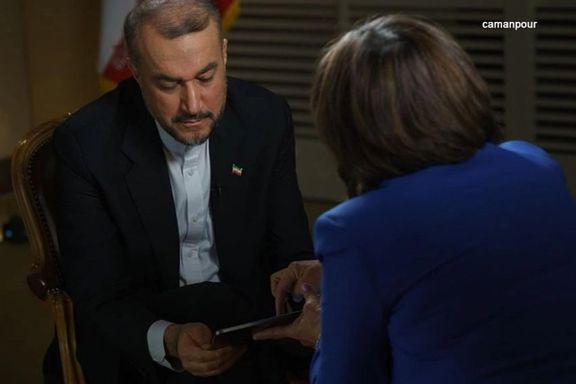
Iran's foreign minister claims that "women in the country have all the necessary freedoms" and that the police "did not kill anyone with a bullet” during the recent protests.
Hossein Amir-Abdollahian made the remarks in a challenging interview with CNN’s Christiane Amanpour, herself of Iranian origin, on Wednesday.
Amanpour conducted the interview without a hijab, in support of Mahsa Amini who died in custody after being arrested for the inappropriate wearing of her hijab. The event sparked mass protests since September, characterized by the slogan, 'woman, life, freedom' as women call for equal rights under the Islamic regime.
More than 500 civilians have since been killed in clashes with security forces with thousands more arrested.
Amanpour raised the issue of the alleged rapes of male and female prisoners at the IRGC detention center, which CNN had verified through its sources. Amir-Abdollahian claimed the reports were "biased and incorrect", stating that he cannot confirm the issue and that there are many such "baseless" claims.
The foreign minister's denial comes as videos of police officers assaulting protesting women in the streets continue to be widely published on social media.
“Women in Iran have all the necessary required freedoms within the framework of the law,” he claimed, calling CNN’s interview was “a confrontation”.
He said: “This is not the way to conduct an interview.”
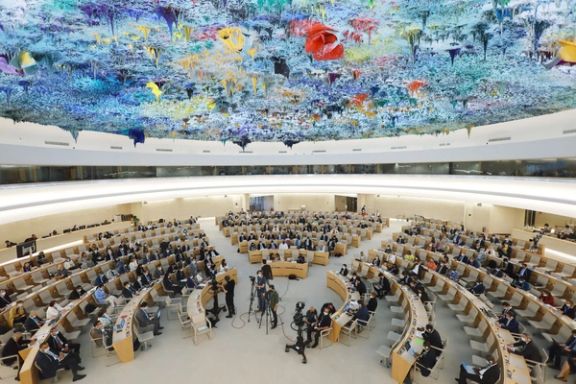
A UN fact-finding mission has called on individuals, groups and organizations to submit information and documentation on the Islamic Republic’s rights violations during ongoing protests.
The mandate was adopted in Resolution S35/1 on the deteriorating situation of human rights in Iran, especially with respect to women and children as well as minorities, in relation to the protests that began in September 2022 after the death in custody of Mahsa Amini.
On November 24, the Human Rights Council decided to establish an independent international fact-finding mission on Iran's deadly repression of protests, which has killed over 500 civilians, until the end of the fifty-fifth session of the Council taking place in March 2024.
The UN mission, in particular, asked for information concerning violent crackdown on peaceful protests by security forces, including alleged arbitrary arrests and detentions, sexual and gender-based violence, excessive use of force, torture and other inhumane treatment and enforced disappearances, as well as the deaths of hundreds of peaceful protesters and thousands of arrests.
The mission is also seeking documentation on physical, psychological and sexual abuse of women and girls for exercising their human rights and fundamental freedoms, and children’s rights violations in relation to the protests, including in raids on schools, and the incarceration of children in ‘psychological centers.'
The call also asked for information on violations of civil society and human rights activists, and reports of charges that carry the death penalty being applied to protesters for offences that are less than the most serious crimes as well as “restrictions on communications affecting landline and mobile telephone usage, including Internet shutdowns and the blocking of social media platforms”.
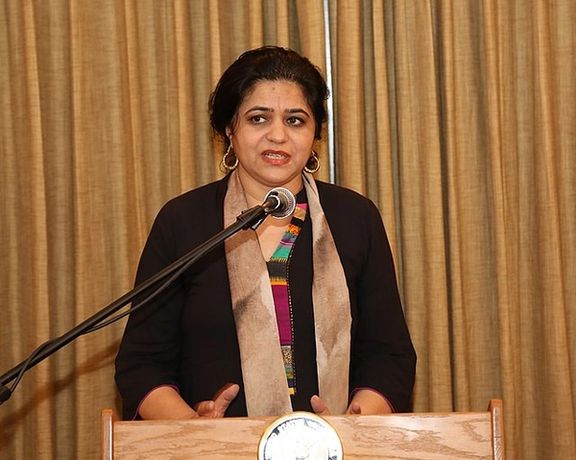
According to the statement issued by the UN Human Rights Council, submissions should be sent as soon as possible, but no later than December 31, 2023, to enable the mission’s Secretariat to process the information, including any follow-up if necessary. Information and documentation can be submitted in English or Persian.
The global outcry against the Islamic Republic’s crackdown on dissent, manifested through a wide array of human rights violations, is getting louder as the opposition forces are uniting and the world seems to be acknowledging the popular uprising. The deteriorating state of human rights in Iran, particularly unlawful executions and chemical attacks on schoolgirls, on the backdrop of worsening economic conditions, workers’ strikes, and devaluation of national currency rial has led to new moves by the international community.
In addition to Europe mulling over designating the Revolutionary Guards – IRGC – as a terrorist organization, US lawmakers are pushing for additional sanctions on Islamic Republic’s parliament. Packed with hardliners, the body provides the legal framework for Tehran’s security forces to murder, torture, and imprison dissidents, US lawmakers say as a bipartisan coalition is pressuring the Biden administration to sanction nearly all of its members amid the government’s crackdown on anti-regime protesters.
Pushing for sanctions on 227 out of 290 members of Iran’s parliament, a group of 26 US representatives and senators from both parties said that "the Islamic Republic of Iran lacks democratic legitimacy, and the members of its parliament are not true democratic representatives of the Iranian people."

Led by Representative Claudia Tenney (R, NY) and Senator Marco Rubio (R, Fla), the group sent a letter to the State and Treasury Departments. "We urge you to take further actions—and encourage international partners to join us -- to impose much clearer costs on the Iranian regime for the execution of protesters."
On Wednesday, State Department spokesperson Ned Price expressed Washington’s unequivocal determination to hold the Islamic Republic authorities accountable for their actions, saying “we are using every authority we have at our disposal to pursue those who are responsible for the atrocious human rights abuses that the Iranian regime has perpetrated against its own people since September of last year.”
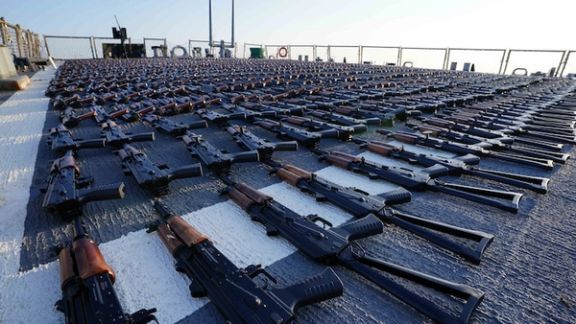
Britain's Royal Navy said Thursday it had seized Iranian weapons, including anti-tank guided missiles, last month from a smuggler’s vessel in the Gulf of Oman.
Britain said the vessel was detected travelling south from Iran at high speed during the hours of darkness by an unmanned US intelligence surveillance and reconnaissance plane in international waters, and was also tracked by a British helicopter.
When hailed by the Royal Navy, the vessel initially attempted to navigate to Iranian territorial waters but was stopped by a team of Royal Marines, who then boarded the small boat and recovered the suspicious packages, Britain's Ministry of Defense said.
"This seizure by HMS Lancaster and the permanent presence of the Royal Navy in the Gulf region supports our commitment to uphold international law and tackle activity that threatens peace and security around the world," British Defense Secretary Ben Wallace said in a statement.
Initial inspection suggested the packages included Iranian anti-tank guided missiles and medium-range ballistic missile components, Britain said, adding that it had informed the United Nations about the seizure.
It follows two previous Royal Navy seizures of Iranian weapons in the region early last year and several seizures by the US Navy or in joint operations since November.
UN experts have in the past made a determination that some weapons used by the Houthi forces in Yemen had Iranian origin.
Tehran has been supporting the Houthis at least for the past 8 years against Yemen's government and its backer Saudi Arabia.
With reporting by Reuters
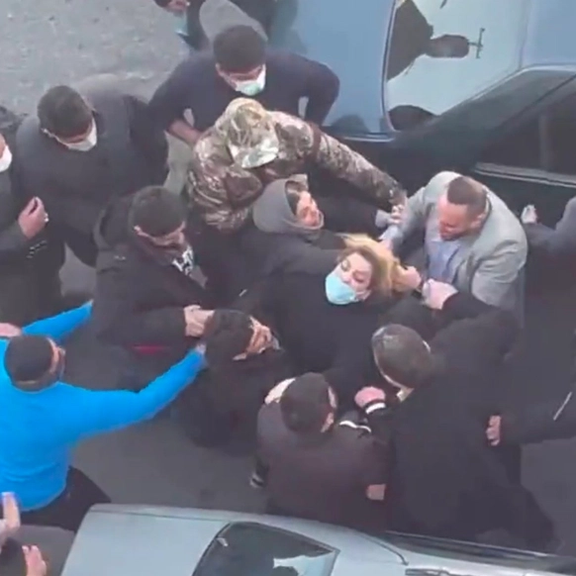
After the worst single day of gas poisonings in Iranian girls' schools, Washington has declared the issue “abhorrent" and called on authorities to put an end to the horror.
On Wednesday, almost 30 schools around the country saw hundreds of schoolgirls become the latest victims of an unknown gas being used in schools apparently to suppress support for the revolution.
In a briefing on Wednesday, State Department Spokesman Ned Price said the reports on the poisonings are both “disturbing” and “concerning”.
Hundreds of schoolgirls - who have been at the forefront of anti-regime protests - have been hospitalized in various cities across the country since November 30 when the first case of a mysterious poisoning was reported in the religious city of Qom.
Price called on the Iranian authorities to thoroughly investigate the poisonings. “It is incumbent on Iranian authorities to respond … [and] put an end to these reported attacks … [and] to hold accountable those who may be perpetrating this,” added Price.
He added: “Women and girls everywhere have an innate right to an education, and education is a universal human right. It is a right that women and girls in Iran should have … It is essential to advancing women’s economic security and to realizing gender equality.”
Interior Minister Ahmad Vahidi, a man wanted by Interpol for the bombing of a Jewish cultural center in Buenos Aires in 1994, said Wednesday that no chemical agent responsible for the poisonings has been found, and the culprits are yet to be apprehended.
He failed to address claims on social media that women dressed in strange attire had been seen walking into school campuses, suggesting a clear campaign to target the schools coming from regime officials.
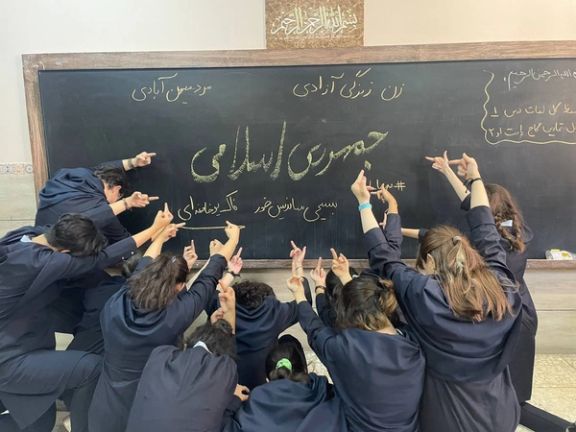
No one has been arrested three months after the first chemical attack on a girls’ school in Iran, amid a new spate of attacks affecting at least 26 schools Wednesday.
Interior Minister Ahmad Vahidi said at a press briefing Wednesday afternoon that so far no one has been arrested for the mysterious poisoning of girls at schools across the country and no chemical agent responsible for the poisonings has yet been found.
The IRGC-linked Fars News Agency had reported the arrest of three individuals earlier on Wednesday.
Vahidi who was assigned by President Ebrahim Raisi at the cabinet meeting Wednesday morning to urgently investigate the incidents also denied that the poisonings, apparently by toxic gases, have caused paralysis in any of the students. He claimed that the symptoms in over 90 percent of the students were induced by stress.

On Wednesday at least 26 more schools were attacked including over a dozen in the capital Tehran, six in Ardabil, two in Kermanshah, and one in Esfahan. In several cases security forces and police used violence against outraged parents who chanted slogans against authorities outside schools.
It is shocking for the public that the government has so far made no arrests or identified suspects, as well as providing extra security around schools. Later on on Wednesday, the United States urged Iran to investigate the poison attacks, a US State Department spokesperson said.
In a tweet Wednesday, prominent journalist Abbas Abdi said the attacks would have already ended if authorities had been as vehement to catch those responsible for the attacks as they are in silencing the poisoned girls’ families.
Children’s parents shouting “Death to the child-killing regime” and “Death to the Dictator” outside a girls’ school in Tehransar in a western suburb of Tehran.
Hundreds of schoolgirls have been hospitalized in various cities across the country since November 30 when the first case of a mysterious poisoning was reported in the religious city of Qom. Attacks have been widespread in Qom and Boroujerd in western Iran so far where tens of schools have been affected. The first attack in Tehran was reported Tuesday. Boys’ schools were attacked only in a few rare cases, including a primary school in Parand Town in the south of the capital, on Wednesday.
Authorities who at first dismissed the reports of poisonings in Qom and attributed the incidents to “children’s pranks” or other reasons including faulty heating, have now admitted that at least 1,200 students were affected by the mysterious fumes.
As many Iranians have said on social media that the attacks are the work of religious zealots who want to prevent girls from attending school, hardliners have tried to blame regime opponents.
Tehran municipality’s Hamshahri newspaper, a hardliner mouthpiece, dubbed the poisoning incidents “A Poisonous Project” and suggestively printed images of opposition figures including the former crown prince Reza Pahlavi, Mujahedin-e Khalq (MEK) leader Maryam Rajavi, and activist Masih Alinejad on its frontpage Wednesday. “By using the students’ poisonings, anti-revolutionaries are trying to cause anxiety among people,” the newspaper wrote.
Schoolgirls at a Tehran hospital Wednesday suffering from short breath and other symptoms including lethargy.
Prince Reza Pahlavi in a tweet Tuesday accused the regime of responsibility for systematic attacks on girls’ schools. Alinejad has also accused the regime and said it is taking revenge on schoolgirls for their participation in the Woman, Life, Freedom protests.
Many parents say on social media that they will not send their girls to school to keep them out of harm’s way but Alinejad has called on male students to boycott classes in their schools and universities on Saturday in support of schoolgirls.
State media and hardliners blame the MEK, which has a long record of terrorist attacks in Iran in the 1980s, more often than anyone else. “I have no doubt that the MEK or other hostile and anti-revolutionary groups are involved [in the poisonings],” lawmaker Ahmad Rastineh said Wednesday.
Another lawmaker, Mohammad-Tala Mazloumi, also blamed the MEK and similar groups, which he said aim to disgrace the Islamic Republic and its educational system, while also pointing a finger at Israel.